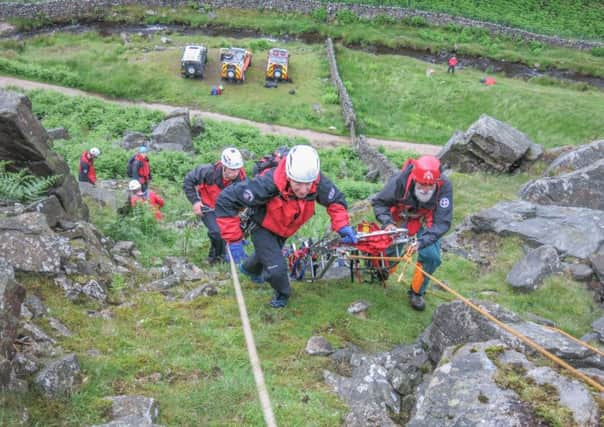Upper Wharfedale Fell Rescue Association column: Record number of callouts in busy month


We are, of course, all volunteers with jobs to go to, so this level was certainly a test of our manpower resources – in some cases members seeking time off work on several occasions to attend.
The ten rescues included four separate rescues of young boys between the ages of four and 16.
Advertisement
Hide AdAdvertisement
Hide AdLocally we attended Brimham Rocks for the third time, dealt with an injured 10 year old boy who came off his motorbike during trails at Bewerley, and made our way to Old Slingsby Woods near Ripon in aid of an injured mountain biker but were then stood down en route as the ambulance crew were able to deal with the situation.
Training of course represents a big commitment on the part of all mountain rescue team members and UWFRA is no exception.
Training officer Alan Scowcroft gives this report on current training schemes.
On joining the team, new members undergo 18 months of training before becoming a full “hill going” team member.
Advertisement
Hide AdAdvertisement
Hide AdA lot of this early training is to ensure that individual team members can look after themselves on the fells at any time, day or night, and in all weather.
So new team members will have a good knowledge of the equipment and clothing required on the fells as well as solid navigational skills, basic first aid, a working knowledge of the team’s radio protocols as well as understanding how an incident is managed by the team leaders.
New team members also need to understand how searches are controlled and be familiar with all the team’s equipment including, for example, the assembly of the team’s stretchers. They also need to know how to operate safely when working with helicopters.
Training is however a continuous process and all team members have to re-qualify in six key areas every three years. Navigation skills are assessed in a night time practice every winter and for many members the worse the weather, the better.
Advertisement
Hide AdAdvertisement
Hide AdCasualty care is obviously a hugely important area and members are encouraged to take the externally assessed Mountain Rescue Casualty Care certificate. All team members must have a good working knowledge of basic life support and this is best practised at least every year.
Other areas that are assessed externally are swift water rescue, working with helicopters and driving.
In order to drive a Land Rover ambulance, team members have to pass an advanced driving assessment followed by a blue lights driving course. Off-road driving is of course also covered.
None of this training could be provided without a huge amount of effort from a lot of volunteers and the team would like to express their thanks to everyone who has helped in the past, especially to our “volunteer” casualties – we haven’t lost one yet!